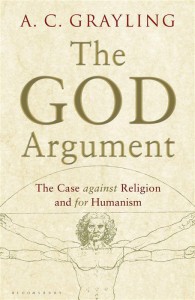Book Review: The God Argument by A.C. Grayling

With his new book, The God Argument: The Case Against Religion and for Humanism, A.C. Grayling, the London-based author of The Good Book: A Humanist Bible, gives us exactly what he promises in the book’s subtitle. The book is divided into two distinct parts: the first outlining arguments against religion, and the second part explaining why humanism is an appealing alternative to God-based religious thought.
For modestly well-read humanists, the first part of the book will not cover a lot of new ground. But in eleven well organized and accurately titled chapters, Grayling simply and strongly marshals the arguments against God, including chapters on “Knowledge, Belief and Rationality,” “Arguing by Design,” “Theistic Arguments” and so forth. He presents them in good order and without angry rhetoric or overblown hyperbole. Indeed much of the strength of the first part of the book is the quiet insistence of his logic and observations. His arguments against belief come across as well reasoned and straight forward, and will give humanists a handy reference to hone their own explanations and arguments.
The second part of the book, “For Humanism” (italics by the author) is also designed topically, with chapters on “Humanism and the Good Life,” “The Ethical and Moral,” “A Humanist on Love, Sex and Drugs,” and “Humanism, Death and the Ends of Life,” among others. Through this method he addresses the major issues that face us all in life: “What sort of person should I be? How should I live? What is my route towards, and contribution to, the good?” At their root, these questions are no different than those posed by people who seek out their answers in religion, but Grayling answers them through the perspective of humanism. As he does with the first part of the book, Grayling puts forth the arguments for a humanistic worldview in a simple way.
The value of this second half of the book cannot be stated too strongly. Books explaining the arguments against God are now readily and widely available. Books explaining an approach to life without religion are not nearly as common, although they are increasing (Greg Epstein’s Good Without God being perhaps the most notable example). By combining the arguments against God with the arguments for humanism, Grayling has made available to the general public in one, single volume a rationale and a pathway to a new way of viewing one’s lifestance and personal philosophy.
For the long-time humanist, Grayling’s book provides a solid reference for arguments against God and a simple, straightforward explanation of humanism. But perhaps for humanists, the most important function of this book can be as a ready recommendation to someone who is not a humanist or even an atheist, but is seriously questioning their own long held religious beliefs and might be interested in an alternative.
